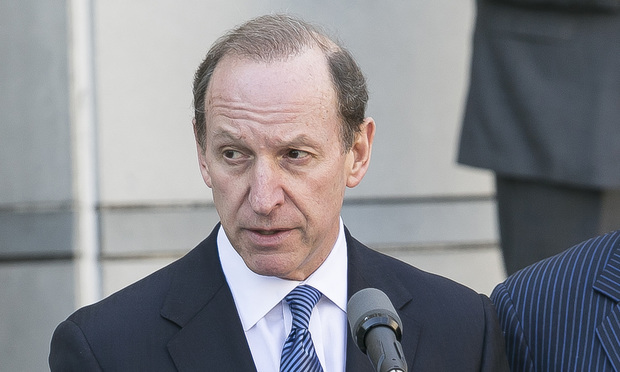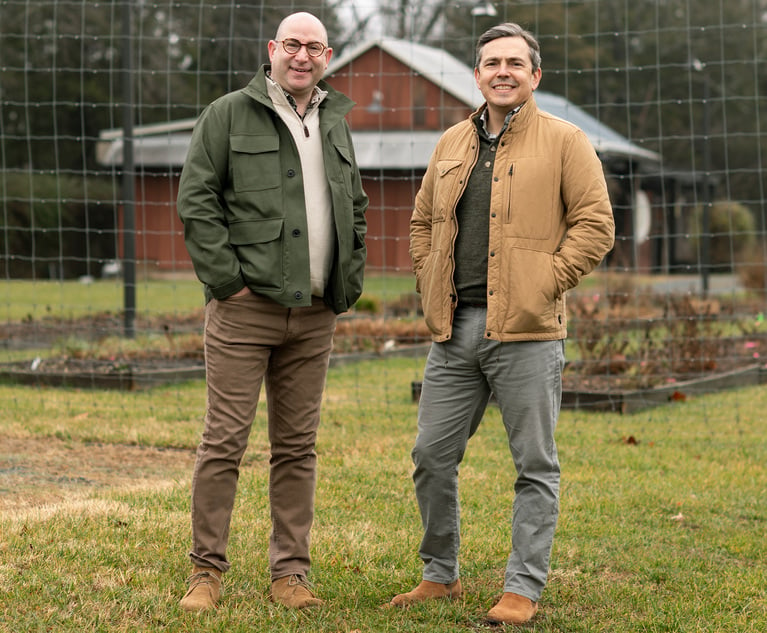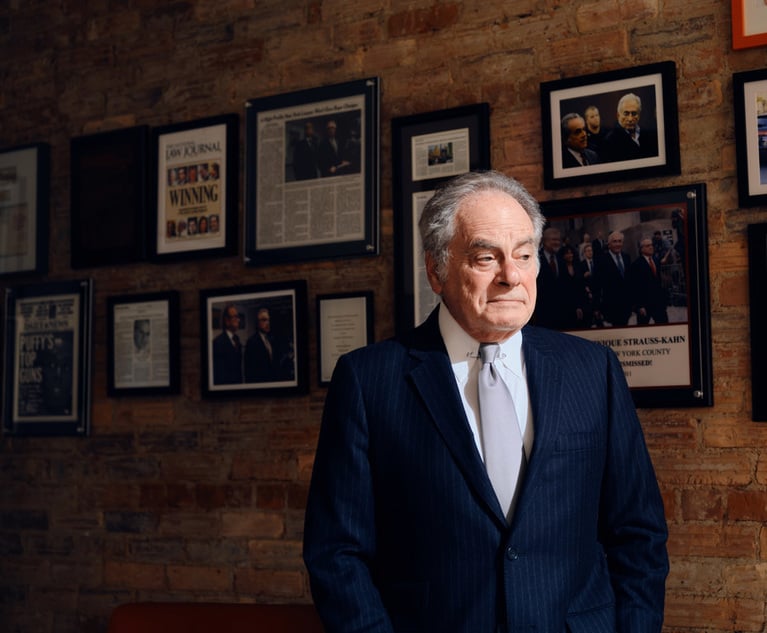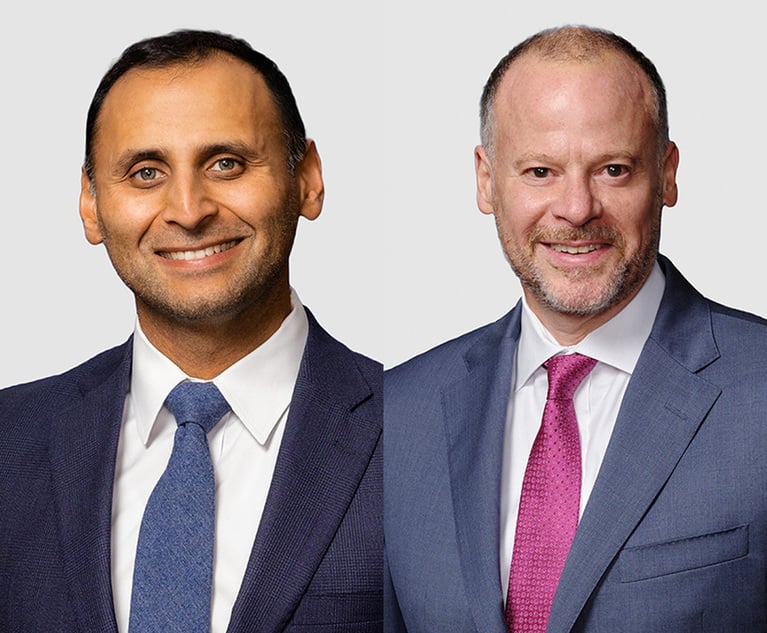Litigator of the Week: Abbe Lowell, Bob Menendez and the Power of Friendship
"Real friends don't have to bribe each other," said Norton Rose Fulbright's Abbe Lowell. "They help each other because they're friends."
February 01, 2018 at 09:12 PM
4 minute read

Norton Rose Fulbright's Abbe Lowell has done it again.
Lowell, well-known for his successful representation of former Sen. John Edwards in his 2012 corruption trial—not to mention other high-profile clients including presidential son-in-law Jared Kushner—notched another big win this week on behalf of New Jersey Sen. Bob Menendez.
The government dropped its corruption case against Menendez Wednesday, even though DOJ lawyers told the court less than two weeks ago they would seek to retry the Democratic senator after a hung jury led to a mistrial last year.
Menendez was indicted in 2015 on several corruption charges related to his friendship with wealthy Florida eye doctor Salomon Melgen. Those included accepting bribes in the form of campaign contributions and private-jet flights in exchange for helping Melgen in government disputes over his businesses and in obtaining visas for several foreign women. Last year's trial spanned 11 weeks, from September to November 2017.
Lowell, a veteran Washington lawyer, said that though he felt the Justice Department's theory of the case was flawed from the beginning, he couldn't help but feel “a little disbelief” when he heard the news Wednesday.
“Whatever is happening on the outside, the inside is complete turmoil,” Lowell said. “It doesn't matter how many cases I've done, they're always stressful.”
That stress was eased, of course, by collaboration with a crack team of other lawyers, Lowell said. His co-counsel was fellow Norton Rose Fulbright partner Jenny Kramer, and the team was joined by group from Greenbaum Rowe Smith & Davis that included Raymond Brown, Justin Kolbenschlag and Gregg Hilzer.
Melgen's team was also instrumental, Lowell said. The doctor was represented by Kirk Ogrosky and Murad Hussain of Arnold & Porter Kaye Scholer and Jonathan Cogan and Samuel Stern of Kobre & Kim.
“I may be the tip of the spear, but the spear has quite a long shaft with a lot of people on it,” Lowell said.
From the beginning of the case, the government's big mistake was characterizing a “true, sincere” friendship between Melgen and Menendez as a corrupt relationship, Lowell explained. The two men had known each other for more than 20 years.
The key for Lowell then was to show the jury that the friendship was real and that nothing done as part of it was actually illegal. There was proof, he said, that the two men hung out in “friendship-oriented” ways, like attending weddings and funerals for one another's family members, and that the gift-giving went both ways.
“Real friends don't have to bribe each other,” Lowell said, “They help each other because they're friends.”
It must have struck a chord with at least some of the members of the jury. One juror, who was dismissed from the case early due to vacation plans, said in an interview the government was just “trying to throw a good man under the bus.”
But a main challenge in the case, Lowell said, was that U.S. District Judge William Walls appeared less-than-receptive to the defense team, repeatedly barring certain witnesses and excluding evidence in a way that Lowell found unfair. At one point, Walls even told one of Menendez's other lawyers to “shut up.“
In the end, however, it was Walls who made a decision that Lowell said was the “catalyst” for the government's decision not to retry the case. On Jan. 24, Wall dismissed several of the charges against Menendez related to campaign contributions.
The judge wrote in a 50-page opinion that the government “failed to prove an explicit quid pro quo regarding the political contribution counts.” He also recused himself from the case.
“The judge's decisions were often very frustrating to the defense and we thought created unnecessary challenges that made our jobs harder,” Lowell said. ” … Maybe at the end, as one would say, all's well that ends well.”
This content has been archived. It is available through our partners, LexisNexis® and Bloomberg Law.
To view this content, please continue to their sites.
Not a Lexis Subscriber?
Subscribe Now
Not a Bloomberg Law Subscriber?
Subscribe Now
NOT FOR REPRINT
© 2025 ALM Global, LLC, All Rights Reserved. Request academic re-use from www.copyright.com. All other uses, submit a request to [email protected]. For more information visit Asset & Logo Licensing.
You Might Like
View All
Amid the Tragedy of the L.A. Fires, a Lesson on the Value of Good Neighbors

Why the Founders of IP Boutique Fisch Sigler Are Stepping Away From the Law and Starting an AI Venture

Like a Life Raft: Ben Brafman Reflects on Nearly 50 Years as a Defense Attorney

Trying a Case for Abu Ghraib Detainees Two Decades After Abuse
Trending Stories
Who Got The Work
J. Brugh Lower of Gibbons has entered an appearance for industrial equipment supplier Devco Corporation in a pending trademark infringement lawsuit. The suit, accusing the defendant of selling knock-off Graco products, was filed Dec. 18 in New Jersey District Court by Rivkin Radler on behalf of Graco Inc. and Graco Minnesota. The case, assigned to U.S. District Judge Zahid N. Quraishi, is 3:24-cv-11294, Graco Inc. et al v. Devco Corporation.
Who Got The Work
Rebecca Maller-Stein and Kent A. Yalowitz of Arnold & Porter Kaye Scholer have entered their appearances for Hanaco Venture Capital and its executives, Lior Prosor and David Frankel, in a pending securities lawsuit. The action, filed on Dec. 24 in New York Southern District Court by Zell, Aron & Co. on behalf of Goldeneye Advisors, accuses the defendants of negligently and fraudulently managing the plaintiff's $1 million investment. The case, assigned to U.S. District Judge Vernon S. Broderick, is 1:24-cv-09918, Goldeneye Advisors, LLC v. Hanaco Venture Capital, Ltd. et al.
Who Got The Work
Attorneys from A&O Shearman has stepped in as defense counsel for Toronto-Dominion Bank and other defendants in a pending securities class action. The suit, filed Dec. 11 in New York Southern District Court by Bleichmar Fonti & Auld, accuses the defendants of concealing the bank's 'pervasive' deficiencies in regards to its compliance with the Bank Secrecy Act and the quality of its anti-money laundering controls. The case, assigned to U.S. District Judge Arun Subramanian, is 1:24-cv-09445, Gonzalez v. The Toronto-Dominion Bank et al.
Who Got The Work
Crown Castle International, a Pennsylvania company providing shared communications infrastructure, has turned to Luke D. Wolf of Gordon Rees Scully Mansukhani to fend off a pending breach-of-contract lawsuit. The court action, filed Nov. 25 in Michigan Eastern District Court by Hooper Hathaway PC on behalf of The Town Residences LLC, accuses Crown Castle of failing to transfer approximately $30,000 in utility payments from T-Mobile in breach of a roof-top lease and assignment agreement. The case, assigned to U.S. District Judge Susan K. Declercq, is 2:24-cv-13131, The Town Residences LLC v. T-Mobile US, Inc. et al.
Who Got The Work
Wilfred P. Coronato and Daniel M. Schwartz of McCarter & English have stepped in as defense counsel to Electrolux Home Products Inc. in a pending product liability lawsuit. The court action, filed Nov. 26 in New York Eastern District Court by Poulos Lopiccolo PC and Nagel Rice LLP on behalf of David Stern, alleges that the defendant's refrigerators’ drawers and shelving repeatedly break and fall apart within months after purchase. The case, assigned to U.S. District Judge Joan M. Azrack, is 2:24-cv-08204, Stern v. Electrolux Home Products, Inc.
Featured Firms
Law Offices of Gary Martin Hays & Associates, P.C.
(470) 294-1674
Law Offices of Mark E. Salomone
(857) 444-6468
Smith & Hassler
(713) 739-1250






